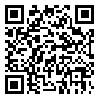Volume 24, Issue 2 (2021)
mjms 2021, 24(2): 59-64 |
Back to browse issues page
1- Student Research Committee, School of Medicine, Guilan University of Medical Sciences, Rasht, Iran
2- Cellular and Molecular Research Center, School of Medicine, Guilan University of Medical sciences, Rasht , Iran ,rostampour@gums.ac.ir
2- Cellular and Molecular Research Center, School of Medicine, Guilan University of Medical sciences, Rasht , Iran ,
Abstract: (1746 Views)
Background: Regarding to chronic nature of epilepsy, side effects and resistance to chemical drugs, and with the objective to access to more effective treatment procedures, herbal medicine have received remarkable interest. The aim of this study was to determine the anticonvulsant effects of hydro-alcoholic extract of Cichorium intybus leaves on PTZ-induced seizure in male mice.
Methods: In this experimental study, 56 albino male mice weighing 20-25 g were divided randomly into seven groups. All groups were injected intraperitoneally. The negative and positive control groups received saline (10 ml/1000g) and Phenobarbital (40mg/kg) respectively. Treatment groups received hydro – alcoholic extract of Cichorium intybus leaves at doses of 100, 300, 500, 800 and 1000 mg/kg. All injections were carried out 45 minutes prior to the experiment. In order to provoke convulsion, after 45 minutes pentylenetetrazol (PTZ) was injected (80 mg/kg) to all groups and initiation time of myoclonic and tonic-clonic seizures and percent of 24 h death were measured.
Results: The results indicated that the extract delayed the initiation time of myoclonic and tonic-clonic seizures in comparison with control group. The delay was significant at doses of 1000 and 800 mg/kg (P < 0.001) and 500 mg/kg (P < 0.01) for myoclonic seizure and 1000, 800 and 500 mg/kg (P < 0.001) and 300 mg/kg (P < 0.05) for tonic-clonic seizure. Also, the extract decreased the 24 h death.
Conclusion: It seems the hydro-alcoholic extract of Cichorium intybus have decremental effect on PTZ-induced seizure.
Methods: In this experimental study, 56 albino male mice weighing 20-25 g were divided randomly into seven groups. All groups were injected intraperitoneally. The negative and positive control groups received saline (10 ml/1000g) and Phenobarbital (40mg/kg) respectively. Treatment groups received hydro – alcoholic extract of Cichorium intybus leaves at doses of 100, 300, 500, 800 and 1000 mg/kg. All injections were carried out 45 minutes prior to the experiment. In order to provoke convulsion, after 45 minutes pentylenetetrazol (PTZ) was injected (80 mg/kg) to all groups and initiation time of myoclonic and tonic-clonic seizures and percent of 24 h death were measured.
Results: The results indicated that the extract delayed the initiation time of myoclonic and tonic-clonic seizures in comparison with control group. The delay was significant at doses of 1000 and 800 mg/kg (P < 0.001) and 500 mg/kg (P < 0.01) for myoclonic seizure and 1000, 800 and 500 mg/kg (P < 0.001) and 300 mg/kg (P < 0.05) for tonic-clonic seizure. Also, the extract decreased the 24 h death.
Conclusion: It seems the hydro-alcoholic extract of Cichorium intybus have decremental effect on PTZ-induced seizure.
| Rights and permissions | |
 |
This work is licensed under a Creative Commons Attribution-NonCommercial 4.0 International License. |


